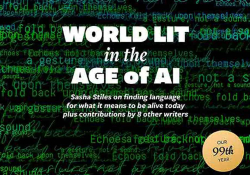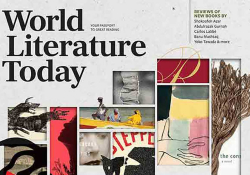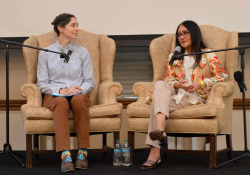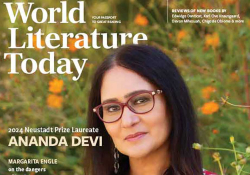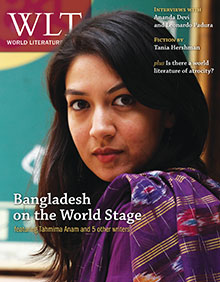Editor’s Note
All the world’s a stage. – Shakespeare
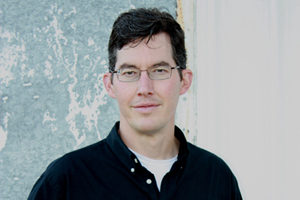
When I went to Boston in March to attend, for the first time, the annual Association of Writers & Writing Programs (AWP) conference, everything about the gathering seemed designed to impress by its grand scale: a reported 11,000 writers and readers in attendance, over 700 exhibitors, more than 500 panels and other events, and a printed program weighing in at a shoulder-numbing 324 pages. And it was hard not to be impressed by the well-orchestrated grandeur of it all, even as the hum of activity seemed to wax and wane depending on the alternatingly enervated and exhausted state of the attendees, who thronged inside the convention center while a foot of snow fell outside Thursday night and all day Friday.
Conspicuously absent from the program, however, was even a single mention of the words world and literature in close proximity. To be sure, with such marquee names as Derek Walcott, Seamus Heaney, Jeanette Winterson, and Adonis as headliners, a certain veneer of worldliness could be found, but with only fifteen panels devoted to literary translation, and precious few to non-US literatures, the default assumption was that literature being written in English was the only game in town, and playing by its rules the writer’s only valid admission ticket. Of course, US literature is one of the most cosmopolitan and heteroglot literatures in the world, but if you start, not with “the world as circumference” but “the United States as center”—a position Wai Chee Dimock has argued against—you risk succumbing to a self-perpetuating and self-congratulatory provincialism. (Nota bene: A special section in our July issue, “US Literature as World Literature,” will tackle this topic head-on.)
When the time came on Saturday morning for my panel, “Looking Out: American Journals on the World Stage,” I was somewhat shocked to be one of only two people (counting the moderator) who showed up ten minutes before the advertised start time of 9:00 a.m. (then again, the last official event the night before didn’t conclude until 10:00 p.m., so only the most devoted lumpen literati were up and about that early in the morning). Ultimately, the audience swelled to about three dozen, and my fellow panelists—Kwame Dawes of Prairie Schooner and Paul Reyes of Virginia Quarterly Review—and I engaged in a lively discussion of what our respective journals have done to internationalize the range of writers represented in our pages. The balance of trade seemed to lie in favor of importing world literature and bringing it to the attention of our mostly Stateside audiences rather than exporting American writers to the world. We each spoke about the importance of enlarging and diversifying what our “national” discourse encompasses, and Dawes, for his part, argued passionately on behalf of a “deep empathy” with voices and cultures from around the world, enriching, in turn, American literary discourse.
Here at WLT, as an American journal on the “world stage,” our international purview dates back to our founding in 1927. Whereas the early focus was mainly on literatures from western Europe, in subsequent decades WLT became truly global in its coverage, in recent years placing even greater emphasis on minority languages and literatures like Ainu, Kurdish, and Zapotec. In 2012 more than fifty countries were represented in these pages, and 40 percent of the essays, poetry, fiction, and interviews featured were translations. In the current issue, we continue pushing back against the tendency to be isolated in our own time and provincial in our own place by showcasing seven Bangladeshi writers in our cover feature (page 43) as well as another three dozen authors throughout the issue. Our first-ever translation from Chakma (two poems) is included in the section on Bangladesh, and Anne Marie Macari’s poem about a prehistoric bone flute (page 21) imagines a temporal range of about 43,000 years.
If all the world’s a stage, let this latest chapter in our “strange eventful history” begin.
